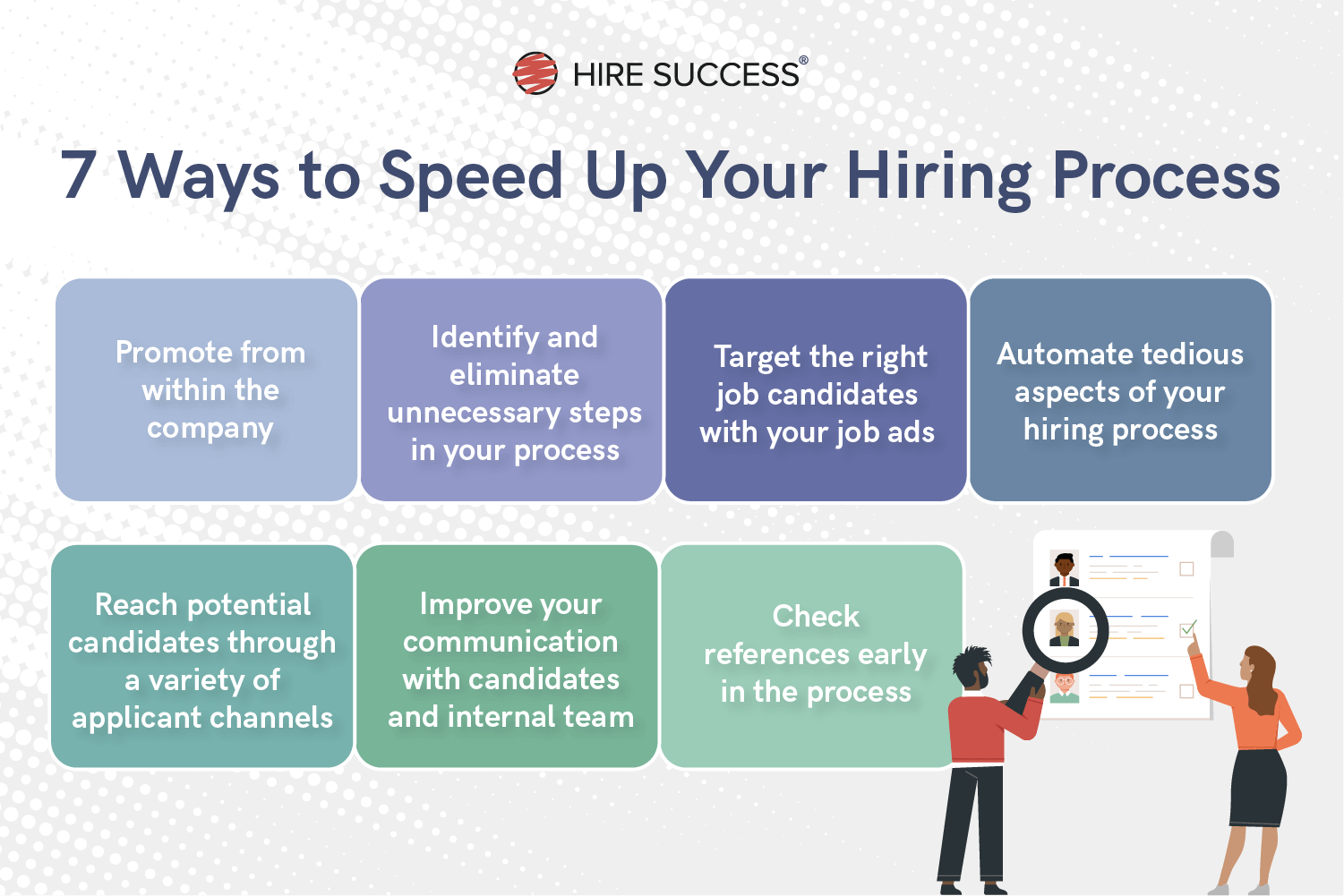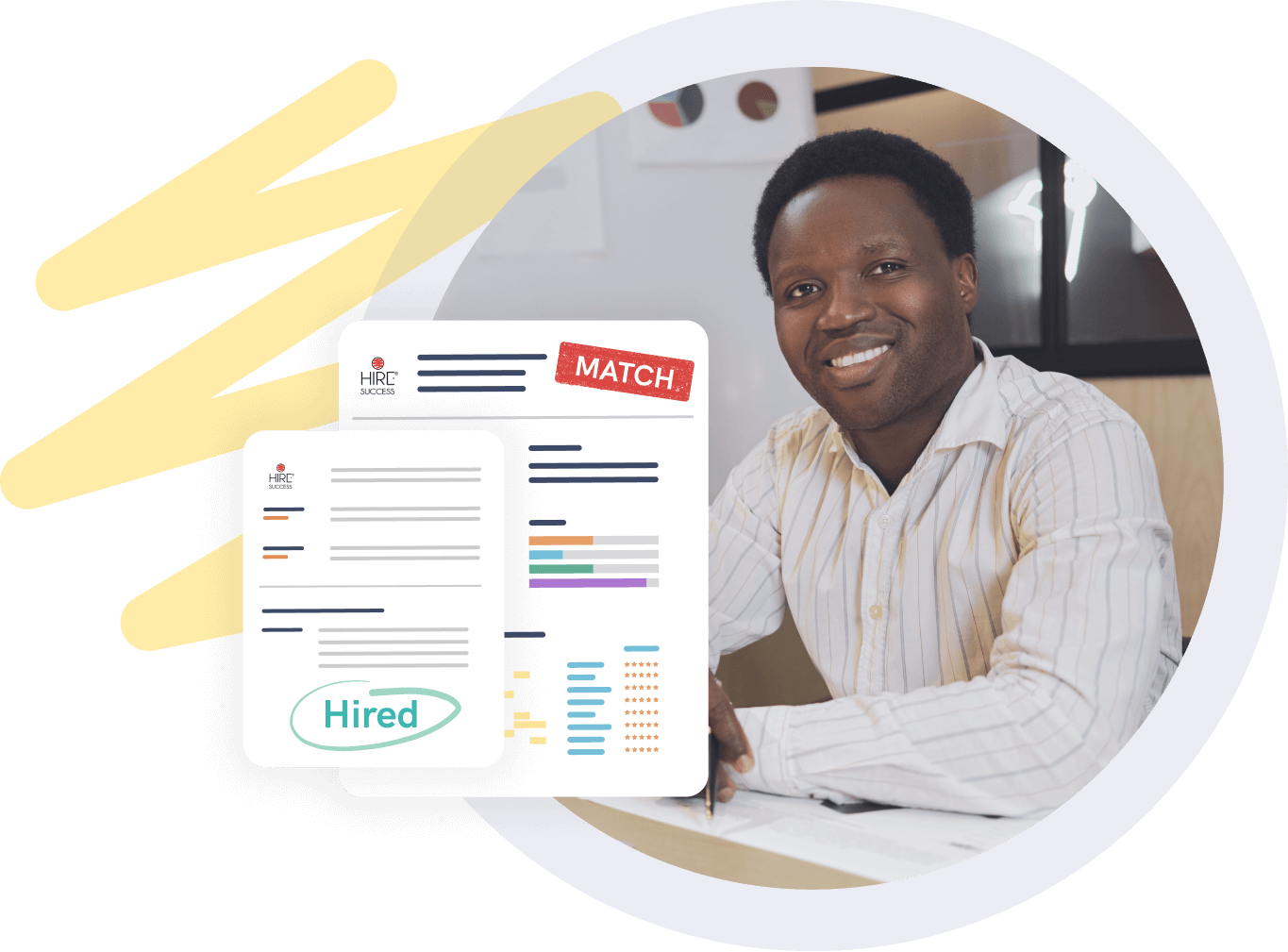Talent shortages and increased competition made hiring difficult in a pandemic. Top candidates were often swept off the market quickly, meaning businesses who failed to act fast were left to hire from a smaller, less-qualified applicant pool.
In 2023, the market changed as it faced an uncertain economy, and companies went through rounds of layoffs, which led to an increase of job applicants. Hiring managers faced the challenge of sorting through a large number of job applications. While the 2024 job market shows signs of improvement, it still seems volatile and unpredictable with the remaining threat of high inflation and a possible recession.
As an employer, it’s important to stay ahead of the curve and optimize your hiring process to avoid wasting time on potential bad hires. You’ll be able to sign the most in-demand talent by shortening your recruitment process before your competition lures them away.
Fortunately, you can speed up the hiring process and hire the best talent on the market.
Key takeaways
- The many reasons why hiring takes a long time can include receiving too many applications due to poorly written job ads or considering too many candidates.
- Utilizing tools like pre-employment tests can help narrow down the list of applicants, making your process faster and more efficient.
- The cost of a slow hiring process may involve losing your top candidate talent to a competitor and increased hiring expenses.
- Tips for speeding up your hiring process include sourcing candidates internally or eliminating redundant steps.
Why does the hiring process take so long?
Hiring takes a long time because it's often a slow, complex process that involves developing ideal candidate profiles, writing job advertisements, reviewing resumes, phone interviews, in person interviews, and so on. The average hiring process can take up to 42 days. Before a hiring campaign starts, you need clear knowledge of what you're looking for in a candidate. Then you search. Then you vet. Then you interview. Finally, you have a shortlist.
Here are some of the most common reasons why the hiring process is so slow.
1. Poorly written job advertisements
Before you can write an effective job description to attract the right kind of candidate, you need a comprehensive description of the job responsibilities and a clear idea of what kind of person is most successful in the position.
Are your most successful employees in this role personable, high-energy go-getters? Are they low-key, compassionate people-pleasers? The language used in advertising should be crafted to appeal to the best personality type for the job.
Starting with a targeted candidate pool will save you tons of time spent weeding out unsuitable candidates during interviews. Personality tests administered to your top employees can help you establish a job baseline for the person most likely to succeed.
Say goodbye to guesswork, hire with confidence
Try our platform for free and get unbiased, data-driven insights into candidates' personal qualities and abilities.
Book a Demo Try It Free2. Ineffective interview process
Interviewing is both an art and a science. Most interviewers use the same tired questions anyone can find online and hear the same canned answers as a result. To avoid the most common problems with the interview process and speed up hiring, you can tailor each interview to the job and ask revealing questions. This will likely give you insight into traits like integrity, problem-solving ability, and personal values.
3. Considering too many job applicants
Having to sort through a large number of job applications is a common reason why the hiring process takes so long. Fortunately, there are many tools to narrow the list to a shortlist of great candidates before the interviewing process happens and speed up the recruitment process. For example, you can make tailored pre-employment tests part of your application process and interview only the top candidates.
4. Unrealistic expectations of the candidates
Very few job candidates are going to be perfect, closeby, and instantly available. If you’re committed to holding out for a prodigy with a proven track record, don’t expect a fast recruiting process. If you’re evaluating candidates based on gut instinct, expect another barrier. Only a data-driven scientific approach will offer realistic expectations and a faster hiring process.
5. Lengthy decision-making process
Top talent is always in high demand, especially so when unemployment is low. Don’t expect talented job seekers to stay on the market for long. If unnecessary procedures and red tape complicate your hiring decisions, you could end up losing the most qualified candidates. Additionally, your hiring process could get even longer.
Why speeding up the hiring process is essential
The pandemic has changed everything for job seekers. The last couple of years have been dubbed “The Great Resignation” because so many people have left their jobs for new opportunities. Companies are hungry for top talent, and with remote work the new normal, they can find that talent anywhere.
In this highly competitive market, you may wind up either having to settle for a less qualified candidate or resign yourself to a long, slow job search if you’re not prepared for fast-recruitment.
The cost of a slow hiring process
If you try to rush the hiring process, you may end up overlooking key aspects of a candidate and making a costly bad hire. Similarly, moving too slowly in the hiring process can also have negative consequences:
- Losing out on top candidates. Top talent is a hot commodity, and employers are moving fast.
- Increased recruitment expenses. The longer the process drags out, the more it costs.
- Reduced revenue and productivity. Your staff can only cover so much extra work. While the position remains unfilled, you’re losing money and overworking remaining staffers.
- Poor candidate experience. No one likes to wait for an answer, and many candidates walk away when there’s a torturous process and a long delay. You can count on frustrated job seekers to post bad experiences on social media, which may discourage others.
7 effective ways to speed up your hiring process

With so much at stake, it might be time to rethink and streamline your hiring strategies. Here are seven ways to make fast recruiting your new normal.
1. Promote from within the company
The BLS reports nearly 11 million jobs unfilled in the United States. With a scarce talent pool and a highly competitive market, finding qualified candidates might be a challenge. As a result, an increasing number of organizations are pivoting to internal mobility and identifying hidden talents internally. Aptitude tests and personality assessments can help you find and polish hidden treasures.
2. Identify and eliminate unnecessary steps in your process
In order to speed up your hiring process, you need to answer the question “how long does the recruitment process take at my business?” Start by getting an accurate measurement of your current time to fill.
Time to fill is the total time it takes to fill a position. It begins when your organization decides to fill an existing or upcoming job opening and ends with a new hire.
Once you’ve established how long it takes, you’ll be able to pinpoint problematic areas and pinpoint areas to shorten.
3. Target the right job candidates with your job ads
Your job posting is the key to attracting the right talent. Information should be accurate and concise. List job responsibilities, education and experience requirements, and what kind of candidate you’re looking for. It should also be persuasive, giving a rosy overview of corporate values and culture. To reach top talent, you should also make the advertisement inclusive.
What’s more, you should also incorporate language that specifically attracts the right personality types per position. Using wording that would appeal to a risk-taking, fast-paced personality may not resonate with a detail-oriented perfectionist and vice versa. Accuracy, conciseness, inclusivity, and charm will improve your talent pool and shorten the recruitment process.
4. Automate tedious aspects of your hiring process
One way to speed up the hiring process is to automate aspects of it with pre-employment testing software like Hire Success®. Our comprehensive hiring solutions can help you perform a number of tasks with ease. It helps you track your candidate's application status, prompt applicants to take relevant pre-employment tests, view and share test results, and keep your pipeline organized throughout the process. A good testing system helps you efficiently develop shortlists of qualified candidates, especially if you've developed a detailed job analysis beforehand for comparison.
Invest in future performance, predict long-term fit
Use our personality assessment to identify candidates who will thrive in their role and in your evolving organization.
Book a Demo Try It Free
5. Reach potential candidates through a variety of applicant channels
Limiting your recruiting efforts to a single platform can reduce the amount of applications you receive for a position, slowing down your hiring process as a result. The more sourcing methods used throughout the process, the more likely you are to find the right candidate quickly.
Some of the top channels include job boards (60%), social professional networks (56%), and word of mouth (50%). Those aren’t the only options. You can also ask for employee referrals, promote from within, and post job openings on your company website to help fill open positions faster. By tracking the applicant-to-interview ratio data for each channel, you’ll be able to see where your most qualified candidates originate.
6. Improve your communication with candidates and internal team
Communication with candidates should be consistent, timely, and transparent. However, that’s not always the case. Roughly 60% of job applicants never hear back from employers following their interview.
With improvements, you’ll be able to keep candidates interested in the position and make the hiring process faster, since candidates will be more likely to wait for a job offer. That means you won’t have to reconsider other final contenders or start over.
Prioritize communication with the top candidates in your applicant tracking system. Reach out to them first.
7. Check references early in the process
Checking references can take up to a week. It’s a good idea to start as soon as you have identified your shortlist of candidates. This will not only shorten the hiring process, but also allow you to get back to candidates quickly and help retain their interest in the position.
Tools to speed up your hiring process
If you’re using an inefficient hiring process, qualified candidates can slip through the cracks, leaving you struggling to fill your vacancies. If you can speed up your hiring process and improve the overall candidate experience, you will also improve retention and cut business costs.
Hire Success® can help you reduce your time to hire without sacrificing quality in the process. Easily establish benchmarks for any position. Use pre-built or customizable pre-employment tests to quickly assess a candidate’s skill set. Administer personality tests to determine whether a candidate would be a good fit and share results with your hiring team in a matter of seconds.


